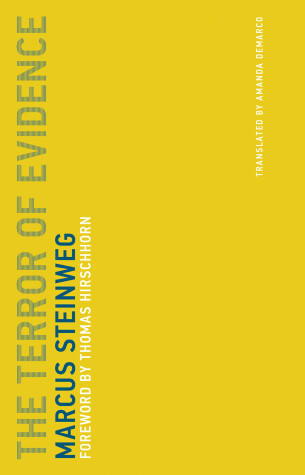Untimely Meditations
2 primary works
Book 4
Marcus Steinweg's capacity to implicate the other is beautiful, bright, precise, and logical, grounded in everyday questions, which to him are always big questions.
—from the foreword by Thomas Hirschhorn
The houses of philosophy need not be palaces.
—Marcus Steinweg, “House,” The Terror of Evidence
This is the first book by the prolific German philosopher Marcus Steinweg to be available in English translation. The Terror of Evidence offers meditations, maxims, aphorisms, notes, and comments—191 texts ranging in length from three words to three pages—the deceptive simplicity of which challenges the reader to think. “Thinking means getting lost again and again,” Steinweg observes. Reality is the ever-broken promise of consistency; “the terror of evidence” arises from the inconsistency before our eyes. Thinking is a means of coping with that inconsistency.
Steinweg is known for his collaborations with Thomas Hirschhorn and the lectures and texts he has provided for many of Hirschhorn's projects. This translation of The Terror of Evidence includes a foreword by Hirschhorn written especially for the MIT Press edition.
The subjects of these short texts vary widely. (“The table of contents is in itself excessive and ambitious,” writes Hirschhorn.) They include pathos, passivity, genius, resentment, love, horror, catastrophe, and racism. And club sandwiches (specifically, Foucault's love for this American specialty), blow jobs, and dance. Also: “Two Kinds of Obscurantism,” “Putting Words in Spinoza's Mouth,” “Note on Rorty,” and “Doubting Doubt.” The Terror of Evidence can be considered a guidebook to thinking: the daily journey of exploration, the incessant questioning of reality that Steinweg sees as the task of philosophy.
Book 7
These 130 short texts -- aphoristic, interlacing, and sometimes perplexing -- target a perennial philosophical problem: Our consciousness and our experience of reality are inconsistent, fragmentary, and unstable; God is dead, and our identity as subjects discordant. How can we establish a new mode of thought that does not cling to new gods or the false security of rationality? Marcus Steinweg, as he did in his earlier book The Terror of Evidence, constructs a philosophical position from fragments, maxims, meditations, and notes, formulating a philosophy of thought that expresses and enacts the inconsistency of our reality. Steinweg considers, among other topics, life as a game ("To think is to play because no thought is firmly grounded"); sexuality ("wasteful, contradictory, and contingent"); desire ("Desire has a thousand names; It's earned none of them"); reality ("overdetermined and excessively complex"); and world ("a nonconcept"). He disposes of philosophy in one sentence ("Philosophy is a continual process of its own redefinition.") but spends multiple pages on "A Tear in Immanence," invoking Nietzsche, Heidegger, Sartre, and others. He describes "Wandering with Foucault" ("Thought entails wandering as well as straying into madness") and brings together Derrida and Debord. He poses a question: "Why should a cat be more mysterious than a dog?" and later answers one: "Beauty is truth because truth is beauty." By the end, we have accompanied Steinweg on converging trains of thought. "Thinking means continuing to think," he writes, adding "But thinking can only pose questions by answering others." The question of inconsistency? Asked and answered, and asked.

